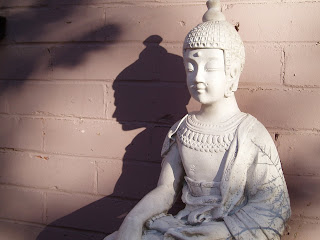
1. -- AWAKENING
Here we experience an opening, kensho (Japanese word for awakening). This might happen only once or repeatedly. Here we catch perhaps a glimpse, or an even more clear experience of our true self, that life as we know it is not exactly as it appears. But instead, we have a profound realization, a knowing of the inarguable truth that we are The Way. But as time goes on, we discover that we are no longer in the state of awakening, that it is no longer an immediate felt sense state of being. Instead the experience of awakening fades into a memory that we find ourselves constantly referring back to. After this, we are possessed by a strong desire to make this a 24/7 experience and we set out on a spiritual path to make this spiritual state a permanent way of being. But yet we’re firmly removed from the experience. This presents dangers for those of us who teach spirituality because we’re teaching about awakening in the 3rd person rather than having a 1st person experience of it while teaching. We begin to fake it until we hopefully make it.
2. -- SURRENDER AND SUBMISSION
This is a lengthy process of letting go of old concepts, beliefs and opinions; the ways in which we think it ought to be, should be, might be, rather than relating directly to a felt lived sense and relating to that. In the course of this path, we may submit and surrender to a teaching or a spiritual path. We receive many new teachings and gather new ideas and concepts. But as we aspire to be truly spiritual people, good people, we begin to disown all the qualities that we consider to be unspiritual. For instance, really spiritual people don’t get angry, aren’t egotistical, aren’t depressed, etc., and so we disown these qualities and relegate them to the shadow. We’ve become even more distorted and one-sided as we try to return to the awakened experience and to be “spiritual”. Shadow work becomes more important than ever during this stage. Roshi says that the majority of us are in stuck in this stage, and that it can take many years to move through and beyond it.
Stage 3 – GREAT DEATH & GREAT LIBERATION
Any doubt about who you are is completely gone. This stage is also called Supreme Enlightenment. All concepts are entirely gone and we are living in direct contact with reality. This is also called Buddha Mind or the absolute. We feel that we have entirely been successful in eliminating the self or the ego. It feels incredibly free and a tremendous relief; but it is just another trap. We might find ourselves saying things like “I don’t feel anger or pain anymore”. But this is because now we’ve completely and thoroughly disowned the egoic self. To others, we come across as impersonal and condescending but we don’t see this. Very few people make it beyond this stage because the pseudo peacefulness is highly addictive. If we can see the trap of it, we must consciously choose to give it up.
Stage 4 – FALL FROM GRACE
This is an experience of great disillusionment. The ego comes back in full force with all its disowned emotions. But because we thought ego was gone long ago, all our filters are also gone and we have nothing to protect us from feeling the full experience of all of our emotions. What’s even more painful is that we not only do we feel our own emotions, but we also feel every one else’s. It is a time of deep despair where everything seems pointless. At this stage, the task is to completely own all our feelings, positive and negative, and to consciously choose to feel them and not disown them yet again. This is where we can work with the emotions in a tantric manner.
5. -- THE HUMAN BEING
This is the stage where we consciously choose to be a human being and to embrace the ego as an important aspect and embrace it consciously and completely. This is where we fully integrate as being human. Here we have the ultimate flexibility, to feel, to own and to experience the entire spectrum of human emotions. Very few people make it to here. It could take years or even lifetimes to accomplish.
All of this reminds me of one of my favorite stories about Chogyam Trungpa Rinpoche. Notorious for showing up late at his own lectures, he strode into one gathering, already speaking as he entered the room. He said that the spiritual path is a very arduous one. If you haven’t begun as yet, you might want to reconsider. But if you have already begun, it’s best to finish.
Here we experience an opening, kensho (Japanese word for awakening). This might happen only once or repeatedly. Here we catch perhaps a glimpse, or an even more clear experience of our true self, that life as we know it is not exactly as it appears. But instead, we have a profound realization, a knowing of the inarguable truth that we are The Way. But as time goes on, we discover that we are no longer in the state of awakening, that it is no longer an immediate felt sense state of being. Instead the experience of awakening fades into a memory that we find ourselves constantly referring back to. After this, we are possessed by a strong desire to make this a 24/7 experience and we set out on a spiritual path to make this spiritual state a permanent way of being. But yet we’re firmly removed from the experience. This presents dangers for those of us who teach spirituality because we’re teaching about awakening in the 3rd person rather than having a 1st person experience of it while teaching. We begin to fake it until we hopefully make it.
2. -- SURRENDER AND SUBMISSION
This is a lengthy process of letting go of old concepts, beliefs and opinions; the ways in which we think it ought to be, should be, might be, rather than relating directly to a felt lived sense and relating to that. In the course of this path, we may submit and surrender to a teaching or a spiritual path. We receive many new teachings and gather new ideas and concepts. But as we aspire to be truly spiritual people, good people, we begin to disown all the qualities that we consider to be unspiritual. For instance, really spiritual people don’t get angry, aren’t egotistical, aren’t depressed, etc., and so we disown these qualities and relegate them to the shadow. We’ve become even more distorted and one-sided as we try to return to the awakened experience and to be “spiritual”. Shadow work becomes more important than ever during this stage. Roshi says that the majority of us are in stuck in this stage, and that it can take many years to move through and beyond it.
Stage 3 – GREAT DEATH & GREAT LIBERATION
Any doubt about who you are is completely gone. This stage is also called Supreme Enlightenment. All concepts are entirely gone and we are living in direct contact with reality. This is also called Buddha Mind or the absolute. We feel that we have entirely been successful in eliminating the self or the ego. It feels incredibly free and a tremendous relief; but it is just another trap. We might find ourselves saying things like “I don’t feel anger or pain anymore”. But this is because now we’ve completely and thoroughly disowned the egoic self. To others, we come across as impersonal and condescending but we don’t see this. Very few people make it beyond this stage because the pseudo peacefulness is highly addictive. If we can see the trap of it, we must consciously choose to give it up.
Stage 4 – FALL FROM GRACE
This is an experience of great disillusionment. The ego comes back in full force with all its disowned emotions. But because we thought ego was gone long ago, all our filters are also gone and we have nothing to protect us from feeling the full experience of all of our emotions. What’s even more painful is that we not only do we feel our own emotions, but we also feel every one else’s. It is a time of deep despair where everything seems pointless. At this stage, the task is to completely own all our feelings, positive and negative, and to consciously choose to feel them and not disown them yet again. This is where we can work with the emotions in a tantric manner.
5. -- THE HUMAN BEING
This is the stage where we consciously choose to be a human being and to embrace the ego as an important aspect and embrace it consciously and completely. This is where we fully integrate as being human. Here we have the ultimate flexibility, to feel, to own and to experience the entire spectrum of human emotions. Very few people make it to here. It could take years or even lifetimes to accomplish.
All of this reminds me of one of my favorite stories about Chogyam Trungpa Rinpoche. Notorious for showing up late at his own lectures, he strode into one gathering, already speaking as he entered the room. He said that the spiritual path is a very arduous one. If you haven’t begun as yet, you might want to reconsider. But if you have already begun, it’s best to finish.





